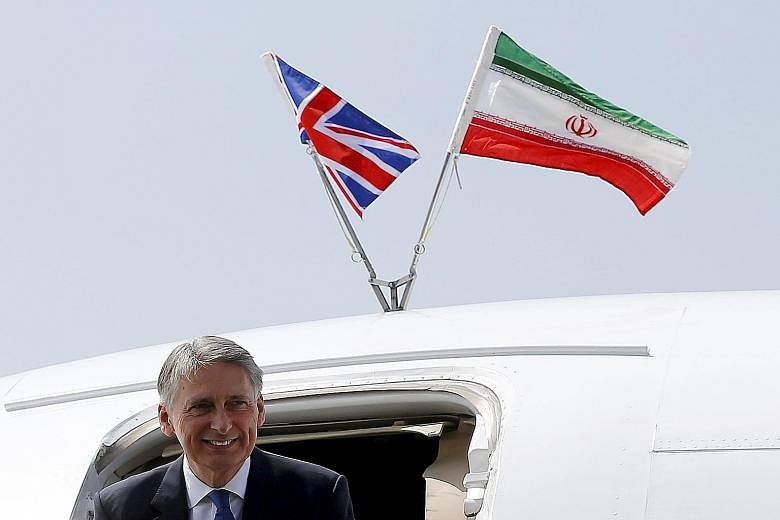TEHERAN • Britain reopened its embassy in Teheran yesterday, a striking signal of how Western ties with Iran have thawed since protesters ransacked the ambassador's residence and burned the Union Jack nearly four years ago.
Foreign Secretary Philip Hammond watched the British flag being raised in the garden of the opulent 19th century building while the national anthem played.
"Today's ceremony marks the end of one phase in the relationship between our two countries and the start of a new one - one that I believe offers the promise of better," he said.
The attack that forced the embassy to close was a low point in diplomacy between the two countries, he said, but the relationship had improved "step by step" since the election of Iranian President Hassan Rouhani in 2013.
Mr Hammond said the nuclear deal that Iran struck with six major world powers last month was also an important milestone.
The agreement prompted a flurry of European visits - including from German and French ministers - aimed at positioning for the end of Iran's long economic isolation.
Britain had operated without an embassy in the country since Iranian protesters stormed its two main diplomatic compounds in Teheran on Nov 29, 2011. The protesters slashed portraits of British monarchs, torched a car and stole electronic equipment.
Graffiti reading "Death to England" still adorns the doors to a grand reception room in memory of the storming.
British Prime Minister David Cameron called the attack a "disgrace", closed Britain's embassy and expelled Iran's diplomats from London.
Iran simultaneously re-opened its embassy in London yesterday and both will initially be run by charge d'affaires, but ambassadors will be agreed within months, Mr Hammond said.
He is only the second British foreign minister to visit Iran since the 1979 Islamic revolution that toppled the US-backed Shah. The last visit was by Mr Jack Straw in 2003.
Accompanying Mr Hammond was a small group of business leaders, including representatives from Royal Dutch Shell, energy and mining services company Amec Foster Wheeler and Scottish industrial engineering firm Weir Group.
After more than a decade of casting Iran as a rogue power seeking to sow turmoil throughout the Middle East, Britain has sought to improve ties with the country, whose proven natural gas reserves are as vast as Russia's.
"In the first instance, we will want to ensure that the nuclear agreement is a success, including by encouraging trade and investment once sanctions are lifted," Mr Hammond said. Under the nuclear deal, sanctions imposed by the United States, European Union and United Nations will be lifted in exchange for Iran agreeing to long-term curbs on a nuclear programme the West suspected was intended to make a nuclear bomb. Teheran has always denied seeking nuclear arms.
"This is a vast emerging market to open up, a vast frontier market: Iran is potentially something of an energy superpower," said Mr Norman Lamont, a former British finance minister who now chairs the British Iranian Chamber of Commerce.
"But it is also necessary to be cautious because we do not know quite what American sanctions will remain," he added.
REUTERS

